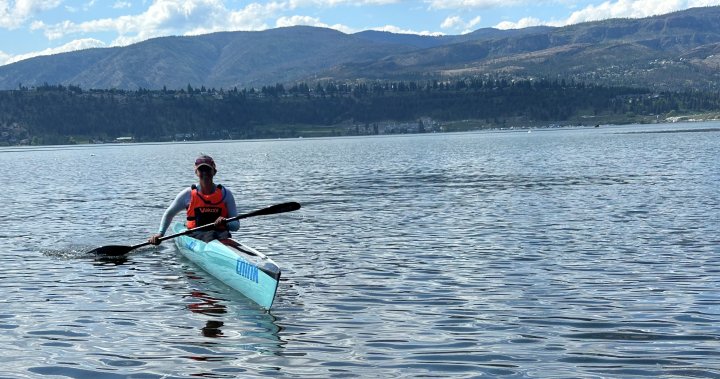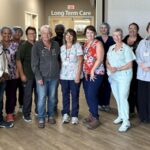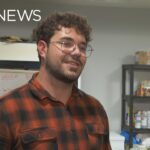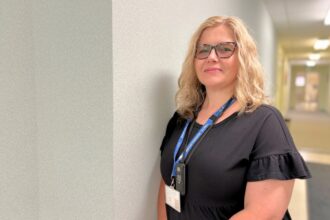In the quiet dawn hours when most Kelowna residents are still nestled in bed, Kathleen Seeley glides across Okanagan Lake’s glassy surface, her paddle board cutting through the water with determination that transcends mere exercise. This 55-year-old Kelowna resident has embarked on an extraordinary mission: paddling 365 kilometers—one kilometer for each day of the year—to raise awareness and funds for autism support services in the Okanagan Valley.
“Every stroke is for someone who needs their voice amplified,” Seeley told me during a lakeside interview, her board propped beside her after completing her 157th kilometer. “My grandson was diagnosed with autism at three years old, and I’ve witnessed firsthand the gaps in support that families face.”
Seeley’s challenge, aptly named “Paddle for Possibilities,” began in April during Autism Awareness Month and will continue through September. She paddles in various weather conditions, sometimes fighting against unexpected winds or navigating through boat traffic on the popular lake.
The initiative has already raised over $17,000 for the Autism Okanagan Foundation, a grassroots organization providing services to families navigating autism spectrum disorders. These funds will directly support specialized therapy programs, family respite care, and educational workshops that are often financially out of reach for many families.
Dr. Rebecca Morrison, developmental psychologist at UBC Okanagan and autism researcher, emphasizes the significance of Seeley’s efforts. “Community-driven fundraising like this provides vital resources where government funding falls short. In British Columbia, families can wait 18-24 months for public assessment services, and private assessments cost upwards of $3,000,” Morrison explained.
The ripple effects of Seeley’s paddle challenge extend beyond fundraising. Local businesses along Okanagan Lake, including Lakeside Water Sports and Downtown Marina, have joined the cause by offering equipment support and promoting the challenge to tourists and locals alike.
James Henderson, whose 12-year-old daughter lives with autism, joined Seeley for a 5-kilometer stretch last weekend. “What Kathleen is doing gives families like mine hope,” Henderson said. “It’s not just about the money—it’s knowing our community sees us and understands our challenges.”
The physical demands of paddling such distances are considerable. Seeley follows a specialized training regimen developed by local physiotherapist Marcus Wong, who specializes in sports performance. “Kathleen has experienced shoulder inflammation and lower back strain, but her mental fortitude is remarkable,” Wong noted. “We’ve implemented a recovery protocol that includes targeted stretching and strength training to prevent injuries.”
Seeley documents her journey on social media, which has attracted attention from autism advocacy groups across Canada. Her posts featuring sunrise paddles and encounters with Okanagan wildlife have garnered thousands of followers, expanding the conversation about autism support resources nationally.
“The most challenging day was during a thunderstorm in June,” Seeley recalled. “I had to make the difficult decision to postpone that day’s paddle, which meant doubling up later in the week. That taught me an important lesson about perseverance versus safety.”
As Seeley approaches the halfway mark of her 365-kilometer journey, local officials are taking notice. Kelowna City Council recently recognized her efforts with a community service commendation, and Mayor Tom Dyas has committed to joining her for the final kilometer in September.
The political significance of grassroots advocacy like Seeley’s cannot be understated. Provincial healthcare funding for developmental services has remained largely stagnant over the past five years, adjusted only for inflation, despite growing diagnosis rates. Community initiatives increasingly fill crucial gaps in the social safety net.
The economic impact of improved autism services represents another important dimension of Seeley’s advocacy. According to a 2023 report from the Canadian Autism Spectrum Disorder Alliance, every dollar invested in early intervention services saves approximately seven dollars in long-term support costs—representing significant potential savings for both families and healthcare systems.
As she prepares for tomorrow’s paddle, Seeley reflects on the unexpected community that has formed around her challenge. “I started this thinking it was about distance and donations, but it’s evolved into something much more meaningful. Every person who shares their story with me adds purpose to each kilometer.”
In a world where awareness campaigns sometimes fail to translate into tangible action, Seeley’s paddle board journey stands as a powerful example of how individual commitment can create meaningful community change. As autumn approaches and Seeley nears completion of her ambitious 365-kilometer goal, one question remains: how might other communities be transformed if more citizens channeled their personal passions into addressing critical social needs?

























